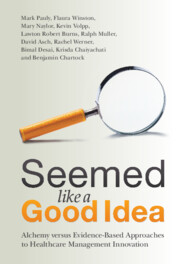 Seemed Like a Good Idea
Seemed Like a Good Idea Book contents
- Seemed Like a Good Idea
- Seemed Like a Good Idea
- Copyright page
- Contents
- Figures
- Contributors
- Preface
- 1 Baseline Observations
- 2 Evidence and Growth in Aggregate Spending and Changes in Health Outcomes
- 3 The Benchmark Decision Model, the Value of Evidence, and Alternative Decision Processes
- 4 Care Coordination
- 5 Evidence-Based Programs to Improve Transitional Care of Older Adults
- 6 Vertical Integration of Physicians and Hospitals
- 7 Evidence on Provider Payment and Medical Care Management
- 8 Evidence on Ways to Bring about Effective Consumer and Patient Engagement
- 9 The Unmet and Evolving Need for Evidence-Based Telehealth
- 10 Evidence and the Management of Health Care for Disadvantaged Populations
- 11 Driving Innovation in Health Care
- 12 Concluding Chapter
- Index
11 - Driving Innovation in Health Care
External Evidence, Decision-Making, and Leadership
Published online by Cambridge University Press: 14 July 2022
- Seemed Like a Good Idea
- Seemed Like a Good Idea
- Copyright page
- Contents
- Figures
- Contributors
- Preface
- 1 Baseline Observations
- 2 Evidence and Growth in Aggregate Spending and Changes in Health Outcomes
- 3 The Benchmark Decision Model, the Value of Evidence, and Alternative Decision Processes
- 4 Care Coordination
- 5 Evidence-Based Programs to Improve Transitional Care of Older Adults
- 6 Vertical Integration of Physicians and Hospitals
- 7 Evidence on Provider Payment and Medical Care Management
- 8 Evidence on Ways to Bring about Effective Consumer and Patient Engagement
- 9 The Unmet and Evolving Need for Evidence-Based Telehealth
- 10 Evidence and the Management of Health Care for Disadvantaged Populations
- 11 Driving Innovation in Health Care
- 12 Concluding Chapter
- Index
Summary
The bulk of medical care system management in the United States does not ground decisions in use of available, high quality evidence. The previous chapters in this book demonstrate both that there sometimes is a rich scientific foundation in health care organization, delivery, and financing that could, if applied, lead to better outcomes, and that sometimes there is little or no evidence on effectiveness of interventions. However, we also observed that the bulk of health care management in the United States does not ground decisions in evidence, using it if available and taking uncertainty into account if not – instead “magical thinking” is often used to make choices.1 Ironically, management holds evidence in high esteem for decision-making by clinicians. In this chapter, we explore why management holds itself to a lower standard regarding its organizational, staffing, and planning choices, seeing experience, intuition, and opinions as good-enough evidence for decisions. We explore what needs to happen for this to change.
Keywords
- Type
- Chapter
- Information
- Seemed Like a Good IdeaAlchemy versus Evidence-Based Approaches to Healthcare Management Innovation, pp. 369 - 397Publisher: Cambridge University PressPrint publication year: 2022
